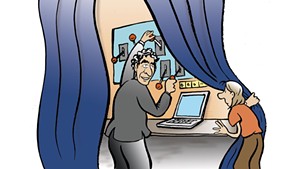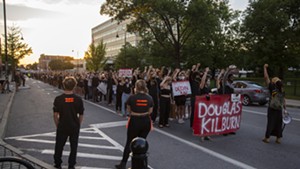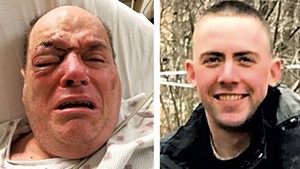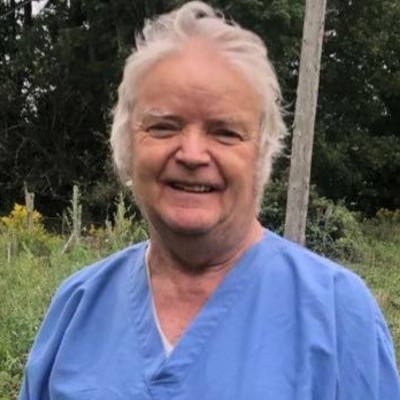Burlington Officials Sought to Change 'Homicide' Finding in Police Case

- File/Matthew Thorsen
- Dr. Steven Shapiro, Vermont's chief medical examiner
State police announced last week that the medical examiner had deemed Douglas Kilburn's death a homicide. Earlier that morning, Burlington Police Chief Brandon del Pozo had contacted the state's top health official with "concerns" about the quality of the medical examiner's work and suggested that his conclusion might be "amended," emails obtained through Vermont's public records law show.
"I have conferred with the mayor and we are in agreement in requesting clarification of these findings before they are made public," del Pozo wrote to Vermont Health Commissioner Mark Levine.
The chief then outlined a detailed — but inaccurate, according to one expert —argument for why he believed the state's chief medical examiner, Steven Shapiro, erred.
Del Pozo concluded: "If the ruling on manner of death is not to be amended, we believe we need an account of the rationale, the standards of proof used in formulating beliefs about this manner in the case at hand and in Vermont generally, and why they were satisfied in this case..."
The mayor's office separately contacted Gov. Phil Scott's staff about the situation, Mayor Miro Weinberger confirmed Wednesday.
The communications were made even though Burlington police had previously handed the case off to Vermont State Police for an independent investigation, which is still ongoing.
Del Pozo and Weinberger said their efforts were aimed at information gathering and accountability, not political influence. "There's not a hint of politics in that [email]," del Pozo told Seven Days.
But never before had someone emailed Levine about how his medical examiners handled a particular autopsy, the commissioner said. He chose not to share the chief's specific concerns with Shapiro, who conducted the autopsy, because he didn't think it would be appropriate, he added.
"I wouldn't want to give myself the power to reverse what a trained forensic pathologist who is abiding by guidelines in their discipline has decided, because I don't believe my expertise would be greater than their expertise in that regard," Levine said.
The Vermont Department of Health turned over del Pozo's April 10 email in response to Seven Days' public records request, with one section redacted. Seven Days also asked for records from the City of Burlington. But on Wednesday, the city invoked a legally permitted 10-day extension in order to respond to the request.
Kilburn was injured March 11 during an altercation with Burlington Police Officer Cory Campbell outside the University of Vermont Medical Center emergency room. He was treated for head injuries and released the following day. During a welfare check two days later, police found Kilburn dead in his bed.
Soon afterward, Burlington police asked state police to conduct an independent review of the incident. Both agencies have stated that Kilburn initiated the altercation with Campbell. He was cited for assaulting a law enforcement officer and disorderly conduct.
State police last week released Shapiro's autopsy findings, which classified Kilburn's death as a homicide. But it attributed his cause of death to numerous underlying health factors, including hypertension, obesity, and diabetes, as well as skull fractures sustained during the encounter with Campbell.
The Burlington Police Officers' Association questioned the validity of the homicide classification. Del Pozo, however, told reporters at an afternoon press conference on April 10 that he didn't think it was appropriate to weigh in on a medical doctor's conclusion.
"I'm not a doctor, and I can't have an opinion — I mean, anyone can have an opinion on anything — but I'm not going to render an opinion on the medical examiner's findings," he said.
But del Pozo's email to Levine hours earlier seemed to do just that. The chief argued that Shapiro's office had not used the correct evidentiary standard when determining Kilburn's manner of death. He wrote that he'd consulted medical examiners in New York and California, who said that examiners must believe injuries caused death "beyond a reasonable doubt" in order to classify a death as a homicide.
The chief's argument runs contrary to official guidance issued by the National Association of Medical Examiners, an organization that accredits local and state offices, and the professional opinion of its current president.
A lengthy NAME guidance manual states that medical examiners may use a "clear and convincing" standard for designating a death a homicide, as opposed to the more modest "reasonable probability" threshold for some other types of deaths, such as those deemed to be natural, accidental or undetermined. The manual defines "clear and convincing" as 90 percent certainty.
NAME president Jonathan Arden told Seven Days that his own professional opinion is that all death classifications should be treated with the same standard: a reasonable degree of medical certainty.
Seven Days read to Arden a line from del Pozo's email in which the chief asserted, "The medical question is whether or not it is beyond a reasonable doubt that but for some act by a person, the decedent would not have died from the causes by which he died."
Arden said the sentence "badly mixed two different standards."
"But for" is legitimate concept in death determinations, meaning that were it not for a particular process, an individual would not have died when, where or how they did, Arden said. But he said the "beyond a reasonable doubt" standard isn't pertinent to the medical examiner's work.
The term is used to instruct jurors on the standard for determining guilt in criminal trials.
Methodologies used to determine the manners of deaths are largely academic. Yet medical examiner's findings steer police investigations. If a medical examiner concludes a person died by natural causes, criminal charges are unlikely.
"That tends to give law enforcement pause," Arden said.
The NAME president declined to speak about the Kilburn case specifically, but he said political pressure on medical examiners is a "well-known phenomenon." Preserving examiners' independence is one of NAME's policy priorities, he said.
Del Pozo rejected any suggestion that he appeared to be using the city's political weight to interfere with an independent investigation.
"If, at first blush, we have questions that don't have easy answers, without trying to drag out the dispute in public, we have the responsibility to talk to the people who oversee the medical examiner," he said. "We just wanted to make sure that the outcome was the right one, and one that we could explain to people and that met the standards of the profession."
Levine, who said he has "complete faith" in the state's medical examiners, said he called del Pozo following his email to clarify the office's role. The chief did not pressure him to change Shapiro's classification over the phone, Levine said.
"It's quite plausible for someone to come away reading that [email] and think, 'Gee, he wants me to do something beyond clarification and education,'" Levine said. "The phone call didn't go down that pathway at all."
Weinberger said he believed it more appropriate to ask questions of the medical examiner prior to the autopsy's public release than afterward, "when it's hard to reverse."
"Is it appropriate for the mayor and police chief to weigh in with concerns and questions to ensure, to the best we can, that the report is correct? Yes, I think that's appropriate," he said.
What's not appropriate, both Weinberger and del Pozo said, would be for them to publicly express their opinion on the medical examiner's work while the state probe is ongoing. Both declined to say whether they still object to the homicide classification in light of del Pozo's conversation with the health commissioner.
But they said they may speak up again once the state police's probe wraps up.
Read the emails here:
Related Stories
-

Vermont Health Department Names Elizabeth Bundock Chief Medical Examiner
By Derek Brouwer November 29, 2021
-

City Confidential: Weinberger Fails to Promptly Notify Officials That an Administrator Is on Leave
By Mark Johnson July 14, 2021
-

Burlington to Pay $45K Settlement in Kilburn Wrongful Death Case
By Derek Brouwer July 3, 2021
-

After a Tough Term, Can Mayor Weinberger Again Win Reelection?
By Courtney Lamdin November 25, 2020
-

Kilburn Family Files Wrongful Death Claim Against Burlington
by Derek Brouwer November 19, 2020
Speaking of...
-

Burlington Will Pay for Some Security Improvements at Decker Towers
Apr 1, 2024 -

Decker Towers Tenant Charged With Pepper Spraying a Woman in Stairwell
Feb 29, 2024 -

Three Victims in Burlington Shooting Were of Palestinian Descent
Nov 26, 2023 -

Prosecutors Won't Charge Burlington Cop for Shooting Mentally Ill Man
Aug 3, 2023 -

Man Accused of Killing Woman in a Burlington City Park
Jul 18, 2023 - More »





Comments (14)
Showing 1-14 of 14
Comments are closed.
From 2014-2020, Seven Days allowed readers to comment on all stories posted on our website. While we've appreciated the suggestions and insights, right now Seven Days is prioritizing our core mission — producing high-quality, responsible local journalism — over moderating online debates between readers.
To criticize, correct or praise our reporting, please send us a letter to the editor or send us a tip. We’ll check it out and report the results.
Online comments may return when we have better tech tools for managing them. Thanks for reading.